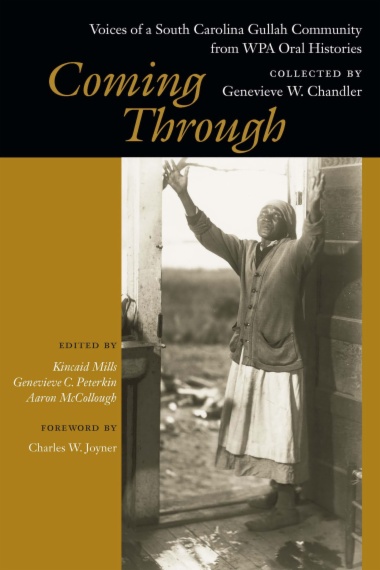Oral histories of formerly enlaved people and their families along the South Carolina coast
Coming Through marks the first complete publication of these interviews with former slaves and their descendants living in the Waccamaw Neck region of South Carolina as collected by Genevieve W. Chandler as part of the WPA Federal Writers Project. Between 1936 and 1938 Chandler interviewed more than one hundred individuals in and around All Saints Parish, a portion of Horry and Georgetown counties located between the Waccamaw River and the Atlantic Ocean. Her subjects spoke freely with her on topics ranging from slave punishment to folk medicine, from conditions in the Jim Crow South to the exploits of Brer Rabbit.
A teacher, artist, writer, and later museum curator, Chandler had no formal training as an oral historian or folklorist, yet the sophistication of her work as documented here anticipates developments in these fields of study a generation later. Her detailed descriptions add social context to folktales, and her careful and systematic renderings of the Gullah language have since been praised as foundational work by Creole linguists. Chandler's Gullah-speaking African American informants range in age from the 9-year-old George Kato Singleton to 104-year-old Welcome Bees. A biography of each subject accompanies the interviews. Collectively these interviews form an intimate portrait of a fascinating subculture of the Carolina coast and the Sea Islands as shared with a remarkable woman who has special access to converse with the people of this traditionally insular world. Moreover they provide an unparalleled firsthand account of the African American experience in South Carolina in the words of those who lived it.
The volume is edited by Chandler's daughter, Genevieve C. Peterkin, and two scholars, Kincaid Mills and Aaron McCollough. The three have carefully established the texts of the interviews in a manner that highlights Chandler's skills as a field linguist and have supplemented the texts with revealing documentation. The collection is enhanced with a foreword by Charles W. Joyner, Burroughs Distinguished Professor of History at Coastal Carolina University; appendixes respecting the WPA project and the nuances of Gullah language and culture; and photographs of the subjects taken by renowned photographer Bayard Wootten—many published here for the first time.
- Cover�������������������������������
- Coming Through����������������������������������������������������������
- Title�������������������������������
- Copyright�������������������������������������������
- Contents����������������������������������������
- List of Illustrations�������������������������������������������������������������������������������
- Acknowledgments�������������������������������������������������������������
- Foreword: Something More Precious: Genevieve Willcox Chandler and Carolina Folk Culture�������������������������������������������������������������������������������������������������������������������������������������������������������������������������������������������������������������������������������������������������������������������������������������
- Introduction����������������������������������������������������
- Welcome Bees����������������������������������������������������
- Will Bees�������������������������������������������
- Hagar Brown�������������������������������������������������
- Louisa Brown����������������������������������������������������
- Sam Brown�������������������������������������������
- Margaret Bryant (Granddaughter)�������������������������������������������������������������������������������������������������������������
- Margaret Bryant (Grandmother)�������������������������������������������������������������������������������������������������������
- Reverend Albert and Ella Carolina�������������������������������������������������������������������������������������������������������������������
- Martha Cox����������������������������������������������
- Will Deas�������������������������������������������
- Ellen Godfrey�������������������������������������������������������
- Matthew Grant�������������������������������������������������������
- Loney “Noonie” Heywood����������������������������������������������������������������������������������
- Mariah Heywood����������������������������������������������������������
- Monday Samson Holmes����������������������������������������������������������������������������
- Ben and Stella Horry����������������������������������������������������������������������������
- Bobbitt Horry�������������������������������������������������������
- Alex Johnson����������������������������������������������������
- Andrew Keith����������������������������������������������������
- Addie Knox����������������������������������������������
- Lillie Knox�������������������������������������������������
- Minnie Ladson Knox����������������������������������������������������������������������
- Richard Knox����������������������������������������������������
- Thelma Knox�������������������������������������������������
- Zackie Knox�������������������������������������������������
- Cinchy Lance����������������������������������������������������
- Gabe Lance����������������������������������������������
- Mike Maybank����������������������������������������������������
- Jim Moody�������������������������������������������
- William Oliver����������������������������������������������������������
- Maude Esther Lee Pickett����������������������������������������������������������������������������������������
- Reverend Aaron Pinnacle�������������������������������������������������������������������������������������
- Fred Poinsette����������������������������������������������������������
- Carrie Pyatt����������������������������������������������������
- Hackless Riley����������������������������������������������������������
- Sabe Rutledge�������������������������������������������������������
- John Simmons����������������������������������������������������
- Reverend Cato Singleton�������������������������������������������������������������������������������������
- Claude Singleton����������������������������������������������������������������
- George Kato Singleton�������������������������������������������������������������������������������
- Boss Skinner����������������������������������������������������
- Ella Small����������������������������������������������
- Lewis Small�������������������������������������������������
- Liza Brown Small����������������������������������������������������������������
- Rebecca Washington����������������������������������������������������������������������
- Lula White����������������������������������������������
- Willis Williams�������������������������������������������������������������
- Martha Wright�������������������������������������������������������
- Appendixes
- A: Memo from Mabel Montgomery
- B: Memo from Folklore Department����������������������������������������������������������������������������������������������������������������
- C: Memo from Henry Alsberg����������������������������������������������������������������������������������������������
- D: Second Memo from Henry Alsberg
- Index�������������������������������
- About the Authors�������������������������������������������������������������������

